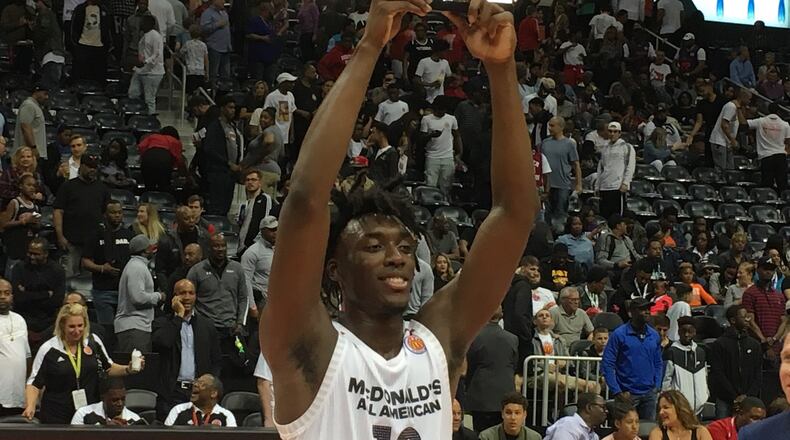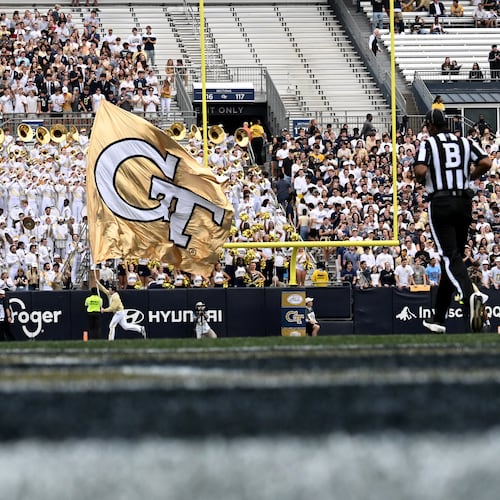In the fall of 2016, Nassir Little was a high-school junior when he made an unofficial visit to Georgia Tech, an indication of his interest in the Yellow Jackets. At that point, he was ranked No. 51 on ESPN’s top 60 for his class. A very good player, but not the concern of the likes of Duke, Kansas or North Carolina.
Tech had offered him a scholarship that summer, among the first power-conference schools to jump on board. Having spotted him early, Tech coach Josh Pastner and then-coach Darryl LaBarrie worked hard to develop a relationship and hoped that Little wouldn’t be discovered by the heavyweights.
On Wednesday, Little not only was a participant at the McDonald’s All-American game at Philips Arena, but he was its MVP, joining a remarkable line of past winners, headlined by LeBron James, Dwight Howard, Derrick Favors, Kevin Garnett, Jerry Stackhouse, Shaquille O’Neal and Alonzo Mourning, among many others.
It’s safe to say that the secret got out. Little, from Orange Park, Fla., is headed to North Carolina, having picked the Tar Heels over Duke, Arizona and Miami. He is now listed at No. 10 in ESPN’s ranking of the senior class. How did he go from 51 to 10?
Hard work and exposure. Little stood out in AAU tournaments in the summer of 2017, performances that caught the attention of college basketball’s elite.
While headed for UNC, Little still holds good feelings for Tech.
“I feel like my relationship with coach LaBarrie and coach Pastner was just different from every other school,” he told the AJC. “I think that me and coach Pastner, me and coach LaBarrie, we were close on a personal level. When it came down to the decision, I had to really make a business decision.”
Presumably, even a Tech fan probably can’t hold it against Little. His play last summer opened the door for him to play in a basketball-mad environment with almost unparalleled tradition, practice daily against elite talent and have a legitimate chance at a national championship.
Little said that if it were a decision based on emotion, things would have turned out differently.
“That’s just me being honest,” he said. “Those are a great group of guys. When I made the decision, telling them was hard for me. But they’re still happy for me. I knew it was real when they texted me after I committed. I can’t explain how special that was to me, the fact that they supported me no matter where I went. I think that shows that when they said they cared about me as a player, that was true.”
Little and what he means for Tech could be interpreted a couple of ways. One, it could be seen as evidence that Pastner never will bring in game-changing talent as long as Duke, North Carolina, Kentucky and schools of their ilk are also involved, no matter how deep a relationship he and his assistants form with prospects.
Which may be true.
It also could be looked at as a promising development for Tech, an affirmation of Pastner and his staff’s willingness to hustle and their ability to spot talent before other coaches do. In this case, they were just too effective at it. If they can keep finding underrated prospects, not all of them are going to blow up into All-Americans and draw the attention of Roy Williams or John Calipari.
Imagine this alternate-universe scenario: In April 2017, Little turns his ankle and is unable to play, or is significantly limited, in summer tournaments. Duke, Arizona, North Carolina and the rest don’t get a chance to evaluate and offer him. An excellent student who has developed a close relationship with Tech coaches, he remains the No. 51 player in his class and selects the Jackets over competing offers from schools such as Louisville, Florida and Georgia. He shows up on campus as the No. 51 player in the country, though he’s a player capable of being named the MVP at the McDonald’s All-American game. (Little did actually miss part of the summer competition, though perhaps not enough for Tech’s purposes.)
Part of Pastner’s vision for recruiting is that he’s just not going to be able to beat out Duke and North Carolina for recruits (at least for now). So where the Jackets have to excel is finding players somewhere in the tier below that, perhaps ranked somewhere between 30 and 60 and that maybe are underranked, and find them early enough that they can be among the first high-major schools to offer.
Then, as they’re more likely to stay four seasons, Pastner and his staff can develop those players and win with them when they’re juniors and seniors. (You may have heard Pastner use the phrase “Get old and stay old.” He says it a lot.) Had Pastner and his staff been responsible for the recruitment of Josh Okogie, he would be precisely the sort of player that would fit the profile. Okogie could play for any team in the ACC, but because of limited exposure, his other top choices besides Tech were Tennessee and Kansas State.
Tech coaches are hopeful that that’s what they have in point guard Michael Devoe, who is ranked No. 41 by ESPN. He picked Tech over Wake Forest and USC. At the McDonald’s game, he received an endorsement from a more celebrated teammate at Montverde (Fla.) Academy that is perhaps exactly what Pastner might hope to hear.
“Mike Devoe, he’s a great shooter, a great all-around player,” said R.J. Barrett, a small forward who signed with Duke and is ranked first in the class. “He could be doing a lot more than what he does on our team.”
Buford High guard Marcus Watson, a gifted scorer, might be the next. A rising senior, he was a frequent visitor to Tech games this past season. He is not in ESPN”s top 60, although he’s rated the No. 5 prospect in the state. (247Sports rates him No. 33 nationally). His list of reported offers – Ohio State, Georgia, Tennessee, Virginia Tech and Florida, among others – is formidable, but not necessarily anyone that Tech couldn’t presumably beat out on the strength of relationships, proximity and conference affiliation.
Could Watson flourish this summer, turn into a five-star prospect and draw a McDonald’s invitation?
Perhaps so. But Josh Pastner probably hopes not.
About the Author
Keep Reading
The Latest
Featured




